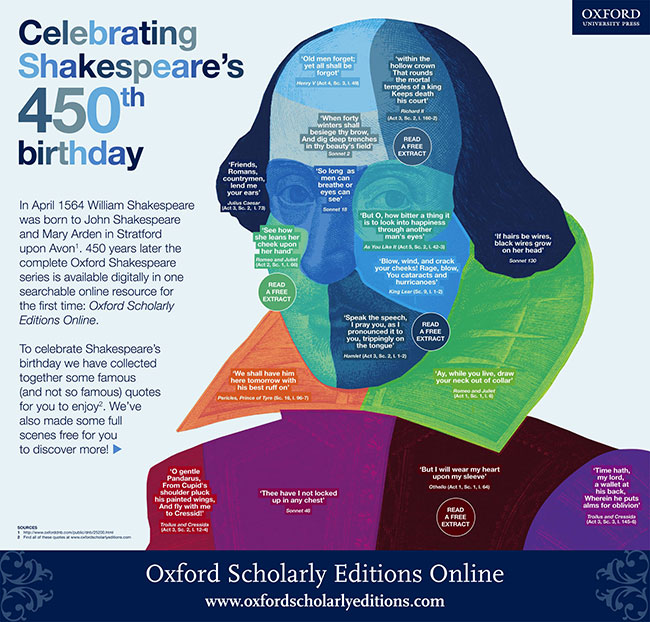 William Shakespeare was born 450 years ago this month, in April 1564, and to celebrate Oxford Scholarly Editions Online is testing your knowledge on Shakespeare quotes. Do you know your sonnets from your speeches? Find out…
William Shakespeare was born 450 years ago this month, in April 1564, and to celebrate Oxford Scholarly Editions Online is testing your knowledge on Shakespeare quotes. Do you know your sonnets from your speeches? Find out…
Your Score:
Your Ranking:
Need a clue or two? Then take a look at our Shakespeare birthday infographic!
Oxford Scholarly Editions Online (OSEO) is a major publishing initiative from Oxford University Press, providing an interlinked collection of authoritative Oxford editions of major works from the humanities, including the complete Oxford Shakespeare series.
Subscribe to the OUPblog via email or RSS.
Subscribe to only literature articles on the OUPblog via email or RSS.
Image credit: The Droeshout portrait of William Shakespeare. Public domain via Wikimedia Commons.
The post Shakespeare’s 450th birthday quiz appeared first on OUPblog.

“But I will wear my heart upon my sleeve …”
– Othello (Act 1, Sc. 1, l.64)
April 2014 sees Shakespeare mature to the ripe old age of 450, and to celebrate we have collected a multitude of quotes from the famous bard in the below graphic, crafting his features with his own words.
To read the free scenes, open the graphic as a PDF.

Download the graphic as a jpg or PDF.
Oxford Scholarly Editions Online provides an interlinked collection of authoritative Oxford editions of major works from the humanities. Scholarly editions are the cornerstones of humanities scholarship, and Oxford University Press’s list is unparalleled in breadth and quality. Read more about the site, follow the tour, or watch the full story.
Subscribe to the OUPblog via email or RSS.
Subscribe to only literature articles on the OUPblog via email or RSS.
The post Happy 450th birthday William Shakespeare! appeared first on OUPblog.

Today sees the launch of a major new publishing initiative from Oxford University Press: Oxford Scholarly Editions Online (OSEO). OSEO will provide trustworthy and reliable critical online editions of original works by some of the most important writers in the humanities, such as William Shakespeare and Ben Jonson, as well as works from lesser-known writers such as Shackerley Marmion. OSEO is launching with over 170 scholarly editions of material written between 1485 and 1660, and annual content additions will cover chronological periods until it contains content from Ancient Greek and Latin texts through to the modern era. This is exciting stuff, and here Project Director Sophie Goldsworthy explains why!
By Sophie Goldsworthy
Anyone working in the humanities is well aware of the plethora of texts online. Search for the full text of one of Shakespeare’s plays on Google and you’ll find hundreds of thousands of results. Browse popular classics on Amazon, and you’ll find hundreds available for free download to your device in 60 seconds or less. But while we’re spoilt for choice in terms of availability, finding an authoritative text, and one which you can feel confident in citing or using in your teaching, has paradoxically never been more difficult. Texts aren’t set in stone, but have a tendency to shift over time, whether as the result of author revisitings, the editing and publishing processes through which they pass, deliberate bowdlerization, or inadvertent mistranscription. And with more and more data available online, it has never been more important to help scholars and students navigate to trusted primary sources on which they can rely for their research, teaching, and learning.
Oxford has a long tradition of publishing scholarly editions — something which still sits at the very heart of the programme — and a range and reach unmatched by any other publisher. Every edition is produced by a scholarly editor, or team, who have sifted the evidence for each: deciding which reading or version is best, and why, and then tracking textual variance between editions, as well as adding rich layers of interpretative annotation. So we started to re-imagine how these classic print editions would work in a digital environment, getting down to the disparate elements of each — the primary text, the critical apparatus, and the explanatory notes — to work out how, by teasing the content of each edition apart, we could bring them back together in a more meaningful way for the reader.
We decided that we needed to organize the content on the site along two axes: editions and works. Our research underlined the need to preserve this link with print, not only for scholars and students who may want to use the online version of a particular edition, but also for librarians keen to curate digital content alongside their existing print holdings. And yet we also wanted to put the texts themselves front and centre. So we have constructed the site in both ways. You can use it to navigate to a familiar edition, travelling to a particular page, and even downloading a PDF of the print page, so you can cite from OSEO with authority. But you can also see each author’s works in aggregate and move straight to an individual play, poem, or letter, or to a particular line number or scene. Our use of XML has allowed us to treat the different elements of each edition separately: the notes keep pace with the text, and different features can be toggled on and off. This also drives a very focused advanced search — you can search within stage directions or the recipients of letters, first lines or critical apparatus — all of which speeds your journey to the content genuinely of most use to you.
As a side benefit — a reaffirmation, if you like, of the way print and online are perfectly in step on the site — many of our older editions haven’t been in print for some time, but embarking on the data capture process has made it possible for us to make them available again through on-demand printing. These texts often date back to the 1900s and yet are still considered either the definitive edition of a writer’s work or valued as milestones in the history of textual editing, itself an object of study and interest. Thus reissuing these classic texts adds, perhaps in an unanticipated way, to the broader story of dissemination and accessibility which lies at the heart of what we are doing.
For those minded to embark on such major projects, OSEO underlines Oxford’s support for the continuing tradition of scholarly editing. Our investment in digital editions will increase their reach, securing their permanence in the online space and making them available to multiple users at the same time. There are real benefits brought by the size of the collection, the aggregation of content, intelligent cross-linking with other OUP content — facilitating genuine user journeys from and into related secondary criticism and reference materials — and the possibility of future links to external sites and other resources. We hope, too, that OSEO will help bring recent finds to an audience as swiftly as possible: new discoveries can simply be edited and dropped straight into the site.
Over the past century and more, Oxford has invested in the development of an unrivalled programme of scholarly editions across the humanities. Oxford Scholarly Editions Online takes these core, authoritative texts down from the library shelf, unlocks their features to make them fully accessible to all kinds of users, and makes them discoverable online.
Click here to view the embedded video.
Sophie Goldsworthy is the Editorial Director for OUP’s Academic and Trade publishing in the UK, and Project Director for Oxford Scholarly Editions Online. To discover more about OSEO, view this series of videos about the launch of the project.
Subscribe to the OUPblog via email or RSS.
Subscribe to only humanities articles on the OUPblog via email or RSS.

“The text that scholars read matters everything to them because all their interpretations are based on what’s in the text. And so if the text is defective, the interpretations are going to be affected.”
In a new series of videos from Oxford University Press, Michael F. Suarez, S.J. talks about the importance of the scholarly edition and its evolution from print to digital.
Click here to view the embedded video.
For the full series, visit our “Putting scholarly editions online” playlist on YouTube.
Michael F. Suarez, S.J. is Director of Rare Book School, Professor of English, University Professor, and Honorary Curator of Special Collections at the University of Virginia. A Jesuit priest, he holds four masters degrees (two each in English and theology) and a D.Phil. in English from Oxford.

 William Shakespeare was born 450 years ago this month, in April 1564, and to celebrate Oxford Scholarly Editions Online is testing your knowledge on Shakespeare quotes. Do you know your sonnets from your speeches? Find out…
William Shakespeare was born 450 years ago this month, in April 1564, and to celebrate Oxford Scholarly Editions Online is testing your knowledge on Shakespeare quotes. Do you know your sonnets from your speeches? Find out…


